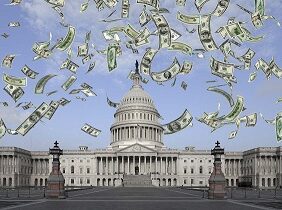View/Download this article in PDF format.
Since its creation of the domestic market for corn ethanol after the energy crisis of the 1970s, the federal government has nurtured and maintained the ethanol industry with a steady stream of subsidies. Originally sold as a way to achieve energy independence and reduce greenhouse gas emissions, ethanol has been a favorite of many lawmakers: ethanol producers have received favorable treatment under the tax code, tariff protection from foreign competition, and even a government mandate for its use. As a result, taxpayers have spent billions of dollars over the last 30 years subsidizing the production of corn ethanol, while at the same time creating unintended costs for consumers and the environment.
To start, the farm bill energy title, a massive piece of legislation covering topics ranging from nutrition assistance to broadband internet, provides government subsidies for the now-mature ethanol industry, including corporate giants such as Archer Daniels Midland. The majority of support for corn ethanol in the farm bill comes from the energy title programs such as the Bioenergy Program for Advanced Biofuels. The Rural Energy for America Program provided subsidies for ethanol blender pumps from 2011 until this was prohibited in the 2014 farm bill, enacted in February.
Subsidies for corn ethanol also litter the tax code – including tax breaks for biodiesel and blender pumps – in addition to Department of Energy programs and other subsidies scattered throughout the federal government such as a mandate for the use of corn ethanol administered by the Environmental Protection Agency (EPA). This year, new Senate Finance Chairman Ron Wyden (D-OR) proposed a tax extenders package which would extend the Alternative Fuel Vehicle Refueling Property Credit, which provides a 30 percent tax break for gasoline stations or other facilities installing biodiesel or 85 percent ethanol (E85) blender pumps. The credit expired at the end of 2013 but is typically extended in larger tax or other fiscal legislation moving through Congress.
The mature corn ethanol industry should no longer receive taxpayer support, whether through infrastructure subsidies for ethanol blender pumps in the tax code or production subsidies in the farm bill’s energy title. Given the nation’s current fiscal health, these subsidies are more egregious than ever.
Other Federal Supports for Corn Ethanol
In addition to the numerous special-interest supports corn ethanol has received over the years, including tax breaks, an import tariff, and infrastructure subsidies, a federal production mandate called the Renewable Fuel Standard (RFS) also heavily benefits corn ethanol. The maze of historic subsidies for corn ethanol has allowed the federal government to pick winners and losers, distort energy and agriculture markets, and contributed to expansion and overproduction of ethanol in the industry.
Thankfully, the tariff and $6 billion-per-year tax credit were forced into retirement at the end of 2011, but the RFS mandate still requires oil and gas companies to blend increasing amounts of ethanol with gasoline each year, and the EPA recently approved corn biobutanol as a new “advanced biofuel.” Corn ethanol has already exceeded its RFS mandate every year since the mandate originated, but with this new approval, corn-based biofuels could exceed corn ethanol’s 15 billion gallon per year mandate (potentially up to 20 billion gallons), spurring numerous unintended consequences such as higher food prices and increased greenhouse gas emissions; if mixtures of gasoline and ethanol increase from the current 10 percent ethanol (E10 blend), corn-based biofuels would consume nearly the entire RFS mandate, the opposite of Congress’ intent for second-generation biofuels like cellulosic ethanol and advanced biofuels derived from non-food crops to meet a greater share of the U.S. renewable fuel supply.
Corn Ethanol Supports in the Farm Bill
Realizing that the corn ethanol industry had already received its fair share of federal handouts, Agriculture Committee leaders prohibited corn starch ethanol from qualifying for energy title spending authorized in the 2008 farm bill, which was reauthorized in 2014. The intent was to allow the next generation of biofuels (advanced fuels made from non-food sources like agricultural residues, wood waste, and perennial grasses) to receive a greater share of grants, loan guarantees, and other subsidies. But even though corn ethanol facilities are prohibited from receiving energy title funding, at least four of its 15 programs allowed nearly $90 million dollars to be spent on corn-based biofuels from 2009 to 2012, in addition to potential taxpayer liabilities with the federal backing of conditional loan guarantees in the U.S. Department of Agriculture’s (USDA) Biorefinery Assistance Program.
As an example, corn ethanol producers avoided the prohibitions on corn starch ethanol funding by convincing USDA to add ethanol blender pumps to its list of projects eligible for energy funding in the farm bill, even though Congress never authorized this controversial use of taxpayer dollars. Before this ended in Feb. 2014, millions of dollars were squandered on the mature corn ethanol industry. Recipients continue to circumvent energy title program eligibility rules by refining biofuels from corn oil instead of corn starch and producing fuels like butanol and biodiesel instead of ethanol.
Farm bill energy title programs supporting corn-based biofuels, in addition to other forms of renewable energy, are listed in Table 1 below.
| Table 1: Corn Ethanol Subsidies in the Farm Bill Energy Title | |||
| Program name | Description | Corn-based biofuels projects receiving funding | Funding for corn-based biofuels from 2009 to 2013 |
| Bioenergy Program for Advanced Biofuels | Payments to advanced biofuels facilities to expand annual production | 1 corn oil biodiesel facility and several corn ethanol facilities, presumably because some also use milo (in addition to corn) as a feedstock in the refining process. | $55 million (grants and loans) |
| Biorefinery Assistance Program | Grants and loan guarantees for advanced biofuels and heat and power facilities | SoyMor, a facility using corn and soybean oil for biodiesel production, received a conditional loan guarantee in 2009. | $25 million (conditional loan guarantee) |
| Repowering Assistance Program | Reimbursements for biorefineries to replace fossil fuel power sources with biomass (like wood chips, municipal solid waste, or perennial grasses) | Two corn ethanol facilities received taxpayer funding to replace natural gas and fossil energy with a biomass boiler and a biogas digester. | $6.9 million (reimbursement payments) |
| * Note that until enactment of the farm bill in Feb. 2014, the Rural Energy for America Program (REAP) provided $3.3 million in subsidies for fuel pumps dispensing corn ethanol even though the program was designed to fund grants and loan guarantees for rural energy efficiency and renewable energy projects, including solar, wind, hydropower, geothermal, and biomass. | |||
Corn Ethanol Supports in the Federal Tax Code
Some subsidies for corn ethanol are still scattered throughout the federal tax code. Three of the most prominent are listed in Table 2 below. Ten-year cost estimates are derived from the Joint Committee on Taxation.
| Table 2: Corn Ethanol Supports in Federal Tax Code | ||
| Tax Credit Name | Description | Total Ten-Year Cost (FY13-22) |
| Alternative Fuel Vehicle Refueling Property Credit | Facilities dispensing certain alternative fuels can receive a refueling property credit in the form of a 30% tax break. Eligible facilities include gasoline stations, those installing biodiesel or 85% ethanol (E85) blender pumps, or repowering sites for electric vehicles. Stations dispensing natural gas, liquefied natural gas (LNG), and liquefied petroleum gas (LPG) are also eligible. The credit expired at the end of 2013 but given recent history, it will be extended in 2014. | $220 million |
| Master Limited Partnerships | “An MLP is typically a limited liability company (LLC) treated as a partnership for taxation purposes and traded on a public exchange… Investors are treated for tax purposes as if they directly earned the MLP’s income. By avoiding double taxation, MLPs have access to lower cost of capital, which allows them to build and operate low-return assets to provide a sufficient rate of return to attract investors.” Of the 100 entities benefiting from the MLPs’ special tax treatment, most are in the oil and gas industry, but in 2008, the transportation and storage of ethanol, biodiesel, and other alternative fuels also became eligible. | $13.4 billion |
| Volumetric Biodiesel Excise Tax Credit and Renewable Biodiesel Tax Credit | The biodiesel production tax credit of $1 per gallon supports eligible feedstocks such as “virgin oils, esters derived from corn, soybeans, sunflower seeds, cottonseeds, canola, crambe, rapeseeds, safflowers, flaxseeds, rice bran, mustard seeds, and camelina, and from animal fats.” The credit expired at the end of 2013 but given recent history, it will be extended in 2014. | $14 billion |
Corn Ethanol Subsidies at the Departments of Energy & Transportation
As stated above, corn ethanol subsidies are also scattered throughout other government agencies, such as the Departments of Energy (DOE) and Transportation (DOT). Some of the most prominent subsidy programs are listed in Table 3 below.
| Table 3: Corn Ethanol Subsidies at the Departments of Energy & Transportation | ||
| Program Name | Description | Total Cost |
| DOE Clean Cities Program | The Clean Cities Program was created in 1993 after passage of the Energy Policy Act of 1992, which “required certain vehicle fleets to acquire alternatively-fueled vehicles”; the program provides “informational, technical, and financial resources to EPAct-regulated fleets and voluntary adopters of alternative fuels and vehicles” in nearly 100 U.S. cities. Clean Cities works with national parks, municipalities, and state-based incentive programs to promote greater consumption of alternative fuels and the installation of new fueling equipment, including 85 percent ethanol (E85) blender pumps. Many recent projects were funded through 2009 American Recovery and Reinvestment Act grants. See a full list of recipients in Table 4 below. | Nearly $300 million spent on 2009 Recovery Act (stimulus) grants for fueling infrastructure and alternatively fueled vehicles. |
| DOE State Energy Programs (SEP) | State Energy Programs “provide financial and technical [energy] assistance to states through formula and competitive grants”; the program has been funded by the 2009 American Recovery and Reinvestment Act although additional grants are awarded annually depending on available funding. Grants have been awarded for the installation of E85 blender pumps, alternative power sources for ethanol biorefineries, and ethanol promotional events. Table 4 includes a list of recipients. | $3.1 billion of total SEP funding to U.S. states under the 2009 Recovery (stimulus) legislation |
| DOT Congestion Mitigation and Air Quality (CMAQ) Improvement Program | The CMAQ program, authorized in 1991, “was implemented to support surface transportation projects and other related efforts that contribute air quality improvements and provide congestion relief”; it is jointly administered by the Federal Highway Administration and the Federal Transit Administration. The City of Hoover received funding through the Alabama Clean Fuels Coalition for a new E85 tank and dispenser at its Public Safety Center. | $4.4 billion in total for the program in 2013-14, funded by the Moving Ahead for Progress in the 21st Century Act of 2012 (MAP-21) |
| DOT Biobased Transportation Research Program/Sun Grant Initiative | One of the 2007 Regional Competitive Grants was awarded to David Holland of Washington State University to examine “crop and fuel production for biodiesel, corn ethanol, and cellulosic ethanol in the Pacific Northwest using potential price and productivity scenarios”; the $200,000 grant was entitled “Regional Economic Analysis of Feedstock Production and Processing in the Pacific Northwest.” | At least $200,000 in 2007 |
As stated in Table 3, several grants for corn ethanol blender pumps, refineries, and promotional activities were funded through the 2009 Recovery Act (stimulus). These subsidies were awarded through either DOE’s Clean Cities Program or its State Energy Programs. Table 4 includes a list of individual recipients.
| Table 4: Corn Ethanol Subsidies Awarded through 2009 Recovery Act via DOE’s Clean Cities or State Energy Programs (SEP) | |||
| State | Recipient Name | Description | Total Cost |
| AL, FL, & GA | Protec Fuel Management, LLC | In partnership with the Renewable Fuel Association, Growth Energy, Testing LLC, General Motors, the National Ethanol Vehicle Coalition, NASA, the U.S. Postal Service, and Enterprise Rent-A-Car, received award to open 30 E85 and B20 stations in FL, AL, & GA. | Up to $900,000 |
| CA | Clean Energy Manufacturing Program | Stimulus funding provided $59.5 million for the Energy Commission’s Alternative and Renewable Fuel and Vehicle Technology Program and $30.6 million for the State Energy Program (SEP) Clean Energy Business Financing Program. A portion was used to fund “ethanol production incentives” which will “re-start idle corn ethanol production facilities by providing price assurance to the plant owners.” | Received $6 million for “ethanol production incentives” |
| CA | Low Carbon Fuel Infrastructure Investment Initiative | Installation of up to 75 new E85 stations by 2012; also funded by Propel Fuels and the California Energy Commission. | Unknown |
| CO | Cities of Fort Collins & Boulder | Using alternative fuel vehicles utilizing power sources such as compressed natural gas, biodiesel, hybrid, electric, and E85. | Unknown |
| ID | State of Idaho | Awards for “two new 12,000-gallon fuel tanks (one for gasoline, one for ethanol) and [an ethanol blender pump].” | Unknown, but ID received $28.57 million in SEP funding from the 2009 Recovery Act |
| IA | Kum & Go, L.C. | In partnership with the Iowa Department of Natural Resources, Iowa Corn Growers Association, Iowa Renewable Fuels Association, National Ethanol Vehicle Coalition, and the Iowa Farm Bureau, received award to install 30 more E85 blender pumps along interstates. | Up to $1 million |
| KS | State of Kansas Energy Division | Western Plains Energy in Oakley, KS, received an award, administered by the Kansas Department of Commerce, for “the construction of a biomethane digester at the Western Plains’ [corn] ethanol plant… the digester will convert feedlot and other waste into biogas.” | Received $15.6 million out of $38.3 million of total SEP funding |
| KY | Mammoth Cave National Park | 1st national park to participate in the National Clean Cities Initiative; utilized flex fuel vehicles & E85 blender pumps. | Unknown |
| MD | Maryland Grain Producers Utilization Board | In partnership with PMG, Mid-Atlantic Petroleum Properties, LLC, Phillips, and Montgomery County, received award to build E85 blender pumps, 20 percent biodiesel (B20), and propane refueling facilities in MD, VA, and DC. | Up to $469,364 |
| MN | American Lung Association of the Upper Midwest | In partnership with the Minnesota Clean Air Choice Team, the Twin Cities Clean Cities Coalition, Kwik Trip, Holiday Companies, the Farmers Union Oil Co., and the Minnesota Corn Growers Association, received award to construct 15 new E85 blender pump stations in MN. | Up to $377,350 |
| MN | Energy Division of Minnesota’s Department of Commerce | Through Clean Cities and SEP, received funding to distribute several alternative fuels, including E85, and “clean out tanks and ensure proper fuel equipment compatibility” since ethanol corrodes existing fueling equipment and storage tanks. | Unknown, but MN received $54.17 million in SEP funding from the 2009 Recovery Act |
| ND | North Dakota Office of Renewable Energy and Energy Efficiency | ND launched a “Blender Pump Pilot Project… in 2009 [that] utilize[d] SEP funding to offer grants to North Dakota motor fuel retailers to purchase pumps for dispensing ethanol or biodiesel. SEP funds… supported the installation of 80 blender pumps [and]… also promote[d] the use of alternative fuels.” | Unknown, but ND received $24.59 million in SEP funding from the 2009 Recovery Act |
| NV | Nevada State Motor Pool | “Fueling infrastructure [awards]… for the use of ethanol based fuels (E85) for state vehicles [in Las Vegas].” | Received $170,250 out of $34.71 million of total SEP funding |
| PA | Greater Philadelphia Clean Cities (GPCC) | With funding from DOE and a state Alternative Fuels Incentive Grant, an E85 corridor with at least 19 flex fuel stations was created from State College to Philadelphia; funds were also used to teach “consumers how use a vehicle identification number to determine E85 compatibility.” Participants ranged from small gas stations to large companies such as AMERIgreen, Shipley Energy, and Sheetz. | Unknown, but PA received $99.68 million in SEP funding from the 2009 Recovery Act |
| SD | State of South Dakota | Awards paid for a statewide energy audit and the “installation of ethanol fueling pumps at 3 fleet locations [of state owned facilities in] Sioux Falls, Rapid, and Pierre” | Unknown, but SD received $23.71 million in SEP funding from the 2009 Recovery Act |
| TN | Knoxville Utilities Board | Utilize E85-powered flexible fuel vehicles, among other alternatively fueled vehicles. | Unknown |
| TN | University of Tennessee | In partnership with the Clean Energy Coalition, Ann Arbor Clean Cities, Clean Fuels Ohio, the Kentucky Clean Fuel Coalition, the East Tennessee Clean Fuels Coalition, Clean Cities-Atlanta, Middle Georgia Clean Cities, the Florida Solar Energy Center, the Space Coast Clean Cities, and the Gold Coast Clean Cities Coalition, received award to increase the availability of E85 and B20 along I-75. | Up to $818,091 |
| TX | City of Austin | Utilize E85-powered flexible fuel vehicles, among other alternatively fueled vehicles. | Unknown |
| WI | State of Wisconsin | In partnership with the Wisconsin Retail Gas Stations/Fuel Distributors, Innovation Fuels Tanco Milwaukee and CHS, Inc., Wisconsin Clean Cities, and Southeast Area, Inc., received award “to build 27 new E85 fueling stations and install biodiesel blending equipment at three terminal locations.” | Up to $1 million |
| — | Alternative Fuel Trade Alliance | Alliance of the Renewable Fuels Association, the National Biodiesel Foundation, the Clean Vehicle Education Foundation, and the Propane Education and Research Council received award to “hold more than 45 workshops & at least 64 stakeholder events to increase knowledge about alternative fuels & advanced vehicle technologies.” | Up to $1.6 million |
Conclusion
It’s time the mature corn ethanol industry survived on its own two feet without taxpayer support. After more than 30 years of federal backing, corn ethanol subsidies scattered throughout the federal tax code and farm bill energy title should be eliminated once and for all. Economic, environmental, and public health costs would also decline if unintended consequences of ethanol production were ended, benefiting drivers, consumers, and the general public.
View/Download this article in PDF format.
For more information, contact Taxpayers for Common Sense at 202-546-8500.











Get Social